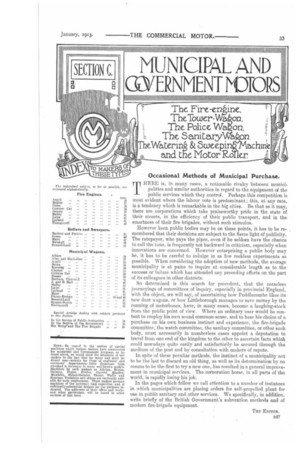MUNICIPAL AND GNERNMENT MOTORS
Page 55

If you've noticed an error in this article please click here to report it so we can fix it.
Occasional Methods of Municipal Purchase.
THERE is, in many cases, a noticeable rivalry between municipalities and similar authorities in regard to the equipment of the public services which they control. Perhaps this competition is most evident where the labour vote is predominant ; this, at any rate, ip a tendency which is remarkable in the big cities. Be that as it may, there are corporations which take praiseworthy pride in the state of their streets, in the efficiency of their public transport, and in the smartness of their fire brigades, without such stimulus.
However keen public bodies may be on these points, it has to be remembered that their decisions are subject to the fierce light of publicity.
The ratepayer, who pays the piper, even if he seldom have the chance to call the tune, is frequently not backward in criticism, especially when innovations are concerned. However enterprising a public body may be, it has to be careful to indulge in as few reckless experiments as possible. When. considering the adoption of new methods, the average municipality is at pains to inquire at considerable length as to the success or failure which has attended any preceding efforts on the part of its colleagues in other districts.
So determined is this search for precedent, that the ceaseless journeyings of committees of inquiry, especially in provincial England, with the object, we will say, of ascertaining how Puddlecombe likes its new dust wagons, or bow Littleborough manages to save money by the running of motorbuses, have, in many cases, become a laughing-stock from the public point of view. Where an ordinary user would be con tent to employ his own sound common-sense, and to base his choice of a purchase on his own business instinct and experience, the fire-brigade committee, the watch committee, the sanitary committee, or other such body, must necessarily in numberless cases appoint a deputation to travel from one end of the kingdom to the other to ascertain facts which could nowadays quite easily and satisfactorily be secured through the medium of the post and by consultation with makers of repute.
In spite of these peculiar methods, the instinct of a municipality not to be the last to discard an old thing, as well as its determination by no means to be the first to try a new one, has resulted in a general improvement in municipal services. The cornoration horse, in all parts of the world, is rapidly losing his job.
In the pages which follow we call attention to a number of instances in which municipalities are placing orders for self-propelled plant for use in public sanitary and other services. We specifically, in addition, write briefly of the British Government's subvention methods and of modern fire-brigade equipment.
THE EDITOR.


























































































